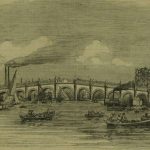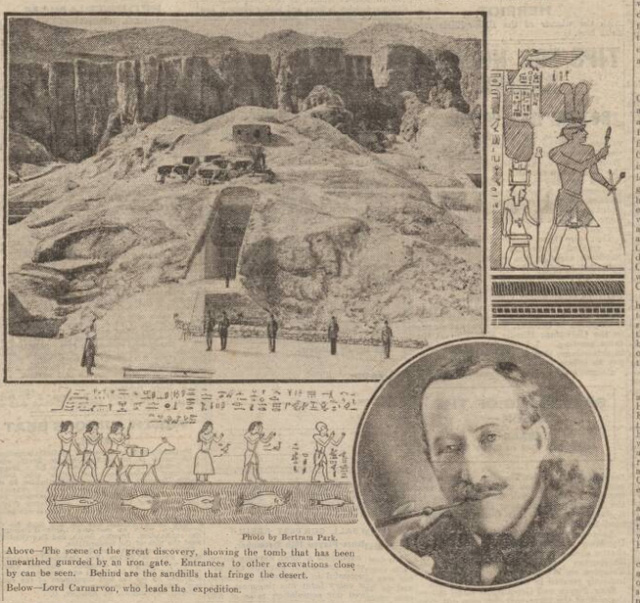This week at The Archive we have been immensely busy adding 173,282 brand new pages to our collection. We have added an incredible 11 brand new titles over the past seven days, spanning such diverse countries as India, China, Dominica and Antigua, as well as some towns and cities slightly closer to home, like Beverley, Birkenhead and Blandford.
Here at The Archive we don’t like to neglect our existing titles either, and so in this vein, we have added new pages to 19 of our existing publications.
So read on to discover more about all of these exciting new additions, and also to find out about a shocking incident from the Second Opium War.
Register now and explore the Archive
Without further ado, let’s dive into the new titles of the week. First up is the Overland China Mail. Published in Hong Kong from 1848, this publication was the fortnightly incarnation of the China Mail, intended to be sent with the English and French mails back to Europe.
The China Mail was an English language newspaper, established in 1845 by Andrew Shortrede. Following the ceding of Hong Kong to Britain in 1842 through the Treaty of Nanking, it was the voice of the British government at the time in Hong Kong, containing government notices and pro-government propaganda. The China Mail would become Hong Kong’s longest-lived newspaper, switching to a daily publication schedule in 1867.
Overland China Mail | 15 January 1855
As for the Overland China Mail, it became weekly, representing ‘a full record of each week’s current history of events in China and Japan, contributed in original reports and collated from journals, published at the various ports in those countries.’ Published at the China Mail Office, Wyndham Street, you could also find within its pages a ‘shipping list for Shanghai, Hong Kong, and other ports,’ as well as a complete ‘commercial summary.’
We move now to another government sanctioned publication, namely the Government Gazette (India), as we continue our commitment to tell the story of British colonization across the world via our newspapers. First published on 15 October 1801 in Madras, now known as Chennai, the first edition lays out the purpose of this new publication:
The Right Honourable the Governor in Council having been pleased to established a Press for printing at the Military Male Asylum, has, for the purpose of combining the public convenience with the advantage of that Institution, resolved to authorise the publication of a weekly paper at the Asylum, to be styled as the Government Gazette, notice is therefore given that after this day all Advertisements, and other Public papers of the Government, will be printed in the Government Gazette only; and all Order or other Public Notices in that paper appearing under the Signature of the Secretaries, or other public offices of the Government, hereby ordered and directed to be conformed to and obeyed accordingly.
Government Gazette (India) | 31 December 1801
The Government Gazette (India) was, therefore, to be the mouthpiece of government. As well as this, it contained military intelligence, news from the local vestries, and international news from the House of Commons, Europe and the Caribbean. Published every Thursday, it also contained news of births, marriages and deaths, and was even partly bi-lingual, publishing some notices in the Tamil language.
Moving back to Britain now, we take a moment to welcome the Sleaford Gazette to our collection. Established in 1846 in the Lincolnshire town of Sleaford, this weekly newspaper appeared every Saturday priced at one penny. Originally printed in the ‘small news room at Mr. Wm Fawcett’s, Market Place,’ it was initially a small monthly paper. Expanding to a weekly publication schedule, it incorporated the Sleaford Journal, and ran until 1960.
Our next new title is the Birkenhead & Cheshire Advertiser. Established in 1855, this Conservative publication circulated in ‘Birkenhead, Liverpool, the Hundred of Wirral, West Cheshire and North Wales.’ Appearing twice weekly on a Wednesday and Saturday, it was priced at one penny and featured local news, such as the latest from the Police Courts, Quarter Sessions and the Industrial Schools, as well as ferry listings. This newspaper ceased publication on 6 July 1940.
Birkenhead & Cheshire Advertiser | 27 January 1877
Let’s take a look now at another new title the Beverley Independent. Published weekly in the East Yorkshire town of Beverley, this richly informative newspaper was priced at one penny. Featuring a range of notices including businesses announcements, religious services and births, marriages and deaths, you could also find all the latest ‘local intelligence’ from institutions like Beverley Town Council, the Beverley Photographic and Sketching Society and the Beverley Dispensary and Cottage Hospital. You can also find the wonderfully useful Beverley trade directory, correspondence, and the latest from the East Riding Quarter Sessions in this newspaper.
We have a bit of a ‘B’ theme amongst our new titles this week, and the third of our ‘B’ trio comes from Dorset, namely the Blandford Weekly News. Established in 1885 as a Liberal publication in the market town of Blandford Forum, it appeared every Saturday, the agricultural town’s market day. Also known as the Blandford and Sturminster Weekly News and Southern Guardian, it labelled itself ‘A Weekly Newspaper Circulating in the Towns and Villages of Dorset.’
Another new weekly title this week is the Weekly Independent (Bromsgrove). Published in the Worcestershire town of Bromsgrove, this independent newspaper was established in 1876 and was a localised version of the Worcester Advertiser. Appearing every Saturday, it was the ‘general newspaper for Bromsgrove, Droitwich, Redditch and Districts.’ Within its pages you could find postings for situations wanted and vacant, news from Worcester City Quarter Sessions, as well as sections entitled ‘Casualties and Offences.’
Weekly Independent (Bromsgrove) | 7 August 1886
Our final new English regional title this week is the Herne Bay Press. Priced at one penny, it was the only newspaper at the time printed in the Kent seaside town of Herne Bay. It was seen as the ‘Recognised Paper of the District,’ with a larger circulation in ‘Herne Bay and Neighbourhood than all the other Kentish papers combined.’
What could you expect, then, from the Herne Bay Press? It promised to be an ‘outspoken monitor on local affairs,’ as well as presenting ‘each week a record of the social life of the town, as portrayed by its various societies.’ It also offered ‘well-condensed reports of the news of Canterbury, Whitstable and the surrounding towns,’ complete with a ‘careful digested summary of London News, a column for the Ladies, and interesting gleanings from the Society papers.’
Herne Bay Press | 30 August 1913
Established in 1883, the Herne Bay Press appeared weekly on a Saturday, the town’s market day. Espousing a neutral viewpoint, it was priced at one penny.
Finally, we are delighted to welcome a trio of Caribbean newspapers to our collection. We begin with Antigua, for which we have added two new newspapers, the Antigua Observer and the Sun (Antigua). Published in the Antiguan capital Saint John’s, the Antigua Observer appeared on a weekly basis and was published by Frederick S. Jewett with the byline ‘We Contend for Truth, Not Victory.’ A lively newspaper, it contained a variety of correspondence and poetry, although it does complain that the regular ‘packet news [is] crowded out by advertisements.’
Meanwhile, the Sun (Antigua) appeared on a daily basis, and claimed to be the ‘Largest Daily Paper in the Leeward Islands.’ Priced at one penny, it also put forward the claim that it was the ‘best advertising medium,’ and indeed, it is filled with richly illustrated advertisements, which sit alongside sporting results and telegrams from abroad, as well as the names of passengers arriving in and departing from the island.
Sun (Antigua) | 13 January 1912
Our final new paper, last and by no means least, is the Dominica Dial. First published on 6 January 1883, it appeared weekly on a Saturday and was edited and published by one William Davies ‘at the Office, angle of Hanover and Cork Streets,’ in the capital of Roseau. Featuring news from Dominica and the rest of the Caribbean, it contained a monthly calendar of events, details on the phases of the moon, correspondence and telegrams with news from far and near.
With 19 of our existing titles updated this week (details of which can be found below), we will spend a moment highlighting a few of our top picks! We have added a new year (1951) to cinema industry title the Kinematograph Weekly, as well as a run of new pages and years to Britain’s best-selling regional title the Manchester Evening News, numbering just over 18,000 new pages in all.
Other highlights include the new pages we have added to the American Register, the title dedicated to high society Americans who found themselves in Britain and Europe, as well as the First World War title, The War, to which we have added the year 1914.
18 October 1860 – The Destruction of the Old Summer Palace, Beijing
At the end of the Second Opium War, a conflict between the British and French Empires against the Chinese Qing dynasty which lasted between 1856 and 1860, British and French troops destroyed the historic Old Summer Palace (Yuanming Yuan), just outside of Beijing.
The destruction of the palace was in reaction to the news of the imprisonment and torture of soldiers and men sent to negotiate the Qing surrender. Henry Loch and Harry Parkes were two of these envoys sent under a flag of truce, and although they were not killed, British commander Lord Elgin gave the order for the palace to be destroyed.
Lord Elgin departs Penang for China | Illustrated London News | 8 August 1857
The Overland China Mail gives us a unique insight into this act of war. As an English-language newspaper being produced in Hong Kong at the time, it was specially positioned to bring the latest news from the conflict.
On 16 November 1860 the Overland China Mail features news from the front, entitled ‘Letters from the Seat of War.’ Sent from Peking (Beijng), it contains the matter of fact report that ‘All that was possible having been done for the recovery of the prisoners, the Summer Palace was burnt to the ground.’
A report from the 27 October 1860 gives a fuller account of proceedings:
The summer palace, four miles off, was found by our cavalry two hours before the French came up; but, the main body of our forces, having halted to look out for the enemy, the French passed across our rear, and on to the summer palace, which our cavalry had been guarding, but had not entered as they could not leave their horses. The stories of the loot got in this place are very wonderful. The general has ordered officers to give up what they had looted, which, together with the rest of the contents of the place, is to be sold and given over to the prize agent.
French troops outside Peking | Illustrated London News | 22 December 1860
So not only was the Summer Palace destroyed, it was thoroughly plundered of its treasures by both British and French forces, although the British, it seems, were prepared to point the finger at the French for starting the looting, and stealing the lion’s share of the valuables.
Two days later, the Overland China Mail gives a further sense of the scale of the looting:
…the Yueng-min-yuen, or summer palace of the Emperor, was taken, and completely looted, affording immense spoil. The chief share of the plunder appears to have fallen to the French, who had the first ransacking of the rich ornaments, jewels, and clocks and watches, the rich robes and embroidered silks of the Son of Heaven; but a quantity of the treasure, which was taken is to be divided between both the French and English. Some privates are said to have sold their shares for about 30,000 francs. The entire British share, including both treasure and private loot, is estimated 90,000 dollars.
‘French Spoils from China’ | Illustrated London News | 13 April 1861
But not all commentators were pleased with the outcome. In a piece published in the Overland China Mail on 15 December 1860 entitled ‘Continuation of the March from Tien-Tsin to Peking – from the Diary of an Artist,’ the writer laments the destruction of the Summer Palace:
The 1st Division proceeds to burn the Summer Palace, in revenge for the deaths of the prisoners. Not being able to catch the perpetrators, they destroy beautiful palaces, magnificent crockery, and plunder all they can lay their hands on. Several people take carts with them to carry away loot, but many are disappointed. The smoke of the burning buildings darkens the heavens for miles.
Indeed, it took 4,000 men three days to burn the Summer Palace, situated as it was over 860 acres. And as for the treasures of the Summer Palace, they have reportedly ended up in 47 museums around the world, stolen from the place they belonged. Today, the Old Summer Palace still lies in ruins, a legacy of the Second Opium War, which ended six days after the palace was destroyed.
New Titles
Title |
Years Added |
| Government Gazette (India) | 1801-1802, 1804-1832 |
| Sleaford Gazette | 1858-1870, 1872-1887, 1889-1893, 1895-1960 |
| Sun (Antigua) | 1912 |
| Overland China Mail | 1853-1861, 1863-1894, 1897-1915 |
| Birkenhead & Cheshire Advertiser | 1877, 1880, 1883-1885, 1889, 1910, 1912 |
| Beverley Independent | 1894 |
| Blandford Weekly News | 1889 |
| Weekly Independent (Bromsgrove) | 1886, 1891 |
| Dominica Dial | 1883-1890 |
| Herne Bay Press | 1913-1918 |
| Antigua Observer | 1848, 1870-1903 |
UPDATED TITLES
This week we have updated twenty of our existing titles.
You can learn more about each of the titles we add to every week by clicking on their names. On each paper’s title page, you can read a FREE sample issue, learn more about our current holdings, and our plans for digitisation.
Title |
Years Added |
| Manchester Evening News | 1926, 1950-1951, 1954-1955, 1958 |
| Ashbourne Telegraph | 1903-1925, 1927-1957 |
| Kinematograph Weekly | 1951 |
| Bromsgrove & Droitwich Messenger | 1914 |
| Winsford Chronicle | 1959 |
| Fleetwood Chronicle | 1888 |
| Stratford Express | 1912 |
| American Register | 1902, 1909 |
| The War | 1914 |
| Chelsea News and General Advertiser | 1872, 1875, 1962-1963 |
| Uttoxeter Advertiser and Ashbourne Times | 1910 |
| Caithness Courier | 1882 |
| Carmarthen Journal | 1910 |
| Manchester & Salford Advertiser | 1847 |
| Voice of India | 1901 |
| Dundee Weekly News | 1890 |
| Nairnshire Telegraph and General Advertiser for the Northern Counties | 1873 |
| Budget (Jamaica) | 1879-1880, 1887-1888 |
| Lyttelton Times | 1854-1863, 1866-1870, 1895-1896, 1898 |
You can keep up to date with all the latest additions by visiting the recently added page. You can even look ahead to see what we’re going to add tomorrow.
















